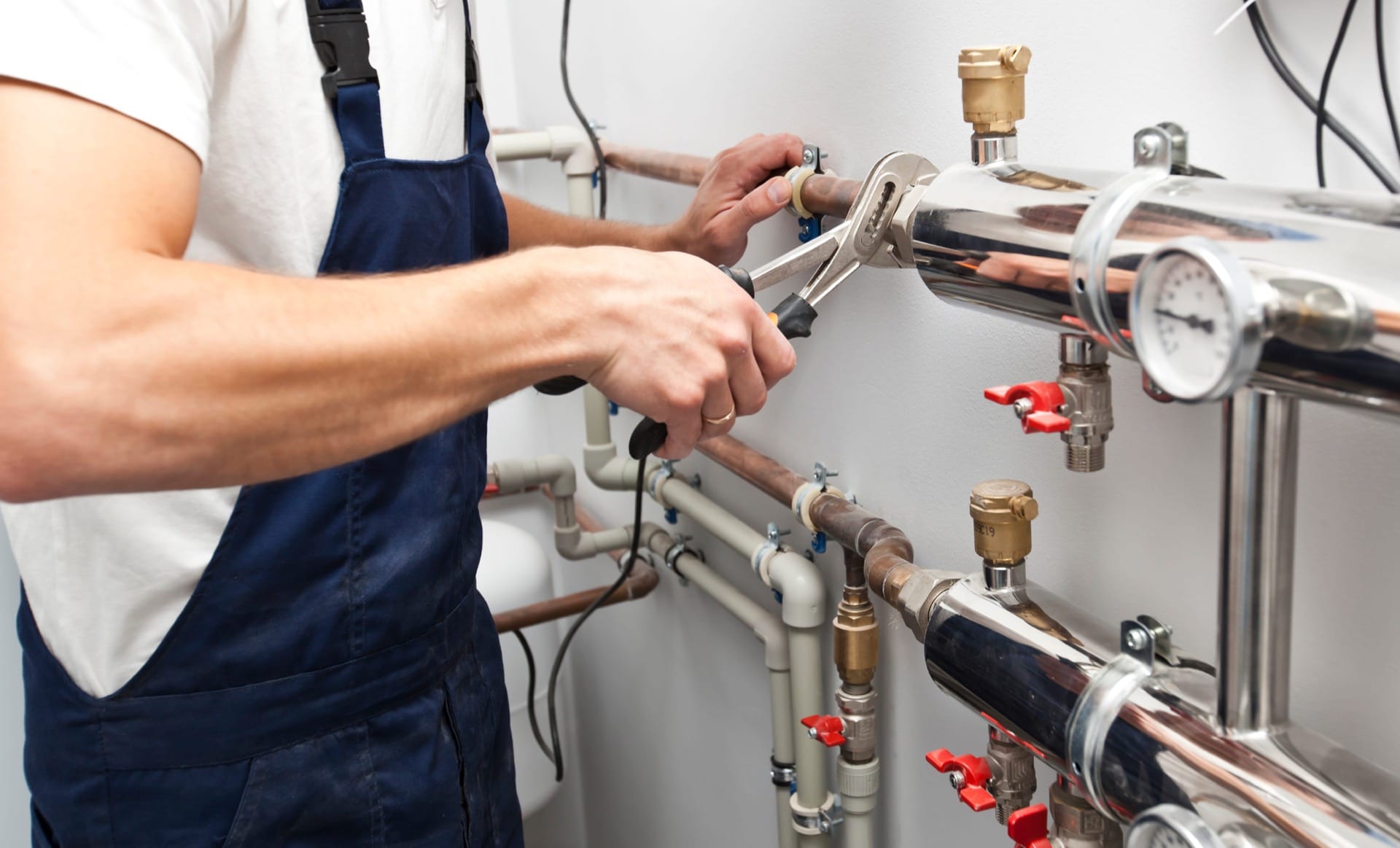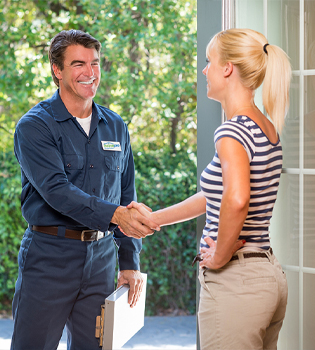
If your property has an HVAC system installed, you expect it to function non-stop and without any problem. Unfortunately, like any other air conditioner, it can break down from different problems. Most often at the worst possible time. An HVAC system is designed to last for years, however, that is only possible with proper maintenance.
After all, a stable and reliable temperature system is an essential part of your home. When it comes to places like Houston, the temperatures can vary depending on the neighborhood and season.
This is why it’s important to prioritize prevention over reparations and if you need an AC repair, don’t delay it. If something goes wrong, it’s essential to know what to look for and effectively communicate with your local ac repair technicians. Here are some of the most common air conditioner problems and how to identify them.

Clogged and Dirty AC Filters
A proper HVAC system provides each home with adequate temperatures and clean air. Clogged air filters can cause damage to the system performance in homes if they’re not regularly changed. Lack of air ventilation can cause your unit to lose efficiency and cause the furnace to overheat. Additionally, a dirty air filter can cause respiratory problems and allergy development.
Not changing your home’s air filter can result in various issues, including the evaporator coil freezing up and a foul smell. This is a common problem, but with a simple check-up, your unit should be back to working normally.
At House Pro, we provide each client with a report email on every problem we encounter and what solution we propose. We base our work values on education and professionalism! Complete our online quote, and let us take care of your unit.
Air Conditioners Leaking Water
An HVAC system generates a lot of condensation during everyday usage. Any condensation should be transferred to the drain line, eventually out of the house. However, if a line gets damaged, your system may leak, causing cracks in your walls and interior structure. In some cases, there could be water leaking out of an electrical circuit.
Both air conditioners and high-efficiency furnaces can produce condensate. One cause of water leaks is clogged drain lines and lack of preventative maintenance. If you’re experiencing one of these HVAC issues, contact a technician immediately because unregulated water buildup will cause mold and electrical damage. A trained technician should be able to determine the source of the water leak and offer you the best possible reparations.
Malfunctioning Thermostat
The control system of your air conditioning is your thermostat. Its role is to relay information to you or your family and also to your HVAC unit. There are a lot of variations of thermostat styles and how they all interact with your whole system, both programmable and non-programmable.
Programmable thermostats primarily operate with batteries that need to be replaced periodically. Most HVAC problems are caused by the thermostat or how the thermostat settings have been set. A quick reference to the manual and the unit’s instructions should cover the first issues, however, if still malfunctioning, they can be quickly diagnosed by an HVAC technician.
If you have further questions, contact our team at House Pro. You can discuss the details of your situation at our service call, and we’ll take care of the rest. We provide recommendations and products to help lower your energy bill, increase indoor air quality, and extend your HVAC system’s life.

Dirty Evaporator Coils
Most HVAC problems are preventable with regularly scheduled maintenance. If dirt and debris have clogged the coils of your system, chances are that your desired temperature will cost a lot more.
A dirty evaporator coil can reduce the efficiency of your furnace and air conditioner and make your system work harder. This leads to more energy consumption and uneven temperature distribution.
Regardless of the state of your AC unit, you should not try to DIY your way out of a problem. Cleaning dirty filters or air vents can procedure moisture leaks, so you ask for professional help. They can safely hose off the outdoor coil after shutting off the power to the condenser in straightforward cases. If the grime, however, affected the HVAC system’s structure, they will have to replace it completely, which may even include a furnace repair, or other costly issues.
Unusual Air Conditioning Noises and Smells
Some furnace noises are part of normal operation, while others are just bad signs. Weird noises from your HVAC system can indicate common HVAC issues, like the bearings in an inducer motor or blower motor failing.
These noises can include whining, clanking, or squealing, which can indicate the need of a HVAC repair sooner or later depending on the cause. Some noises may be caused by airflow issues, dirty heating and cooling systems, or a broken fan switch. Either way, you shouldn’t ignore any sudden and new noise your air conditioner makes that you aren’t accustomed to.
A good air conditioning unit should always be odorless. All smells coming through the vents are signs of bad behavior. Smelling smoke can signal an electrical failure, which is a fire hazard. If you believe there is an ignition risk, call an HVAC professional immediately. Mold infestations or rotting animals stuck in the vents may cause other odors. Nevertheless, any foul odor should immediately be a red flag, and you should get it checked as soon as possible.

Pilot or Ignition Problems
One of the more dangerous parts of an HVAC unit is the ignition efficiency. Without regular maintenance, you’re putting your loved ones and yourself at risk. Ignition problems can result from several reasons, such as a dirty pilot light, flame sensor, short cycling, or a blocked fuel supply. Only a professional should determine the cause and fix the unit in such cases. It can be a simple wear and tear of an ignition component, or it can be a gas leak, which can be disastrous.
Our team at House Pro can assess the ignition component’s health and determine other possible issues. We will offer a report after our assistant if you want to learn more. Either way, it’s vital to have regular maintenance, especially because ignition issues are tied to dangerous elements like natural gas and high voltage.
Tripped Circuit Breakers
The most common reasons for your breakers tripping are that the blower is overworking. If your ventilation system gets blocked, your blower will have to work hard to regulate your temperature. Many times, the airflow is affected by a dirty filter, which will increase the energy consumption and even trip the breakers. Before resetting it, you should make sure everything is clean.
Technicians can determine if the issue is caused by a furnace problem or a malfunction of the circuit breaker itself. Other examples include water leaks, closed or blocked-off air registers, and dirty coils. If the problem continues, you should contact a trained service technician.
If you experience issues with your HVAC system, contact someone from House Pro for inspections and regular checkups. Prevention is the best way of protecting your investment and your loved one. Look after your home and start taking care of your HVAC today.
AC Unit Not Turning On
An air conditioning unit that fails to turn on is a common but frustrating problem for many homeowners. Several factors could cause this issue, ranging from electrical problems to internal malfunctions within the system. One of the first things to check is the thermostat settings. Ensure that it is set to the “cool” mode and the temperature is lower than the current room temperature. Sometimes, simple issues like dead batteries in the thermostat can be the culprit.
Another possible reason for an AC unit not turning on is a tripped circuit breaker or blown fuse. The electrical panel should be inspected to see if the breaker controlling the AC unit has been tripped. If this is the case, resetting the breaker or replacing the fuse might solve the problem. It is also possible that a power surge or outage could have affected the system, necessitating a reset of the unit.
Problems within the AC unit itself can also prevent it from turning on. For instance, issues with the contactor, which is the switch in the outdoor unit that starts the compressor and condenser fan motor, could hinder operation. Faulty wiring, a malfunctioning capacitor, or a damaged compressor can also be significant factors. Moreover, a clogged air filter can restrict airflow, causing the unit to overheat and shut down as a safety precaution.
To accurately diagnose and resolve an issue with an AC unit not turning on, it is crucial to consult a professional. Contact a repair technician from House Pro to thoroughly inspect your system, identify the problem, and perform the necessary repairs to restore your home’s comfort efficiently and safely.
Air Conditioner Not Blowing Cold Air
An air conditioner that is not blowing cold air can be a major inconvenience, especially during hot weather. This air flow issue can stem from various underlying problems within the system. One common cause is a dirty or clogged air filter, which can restrict airflow and reduce the system’s efficiency. When the airflow is obstructed, the air conditioner struggles to cool the air effectively, leading to inadequate cooling.
Another potential reason for this hot air issue is low refrigerant levels. Refrigerant is essential for the cooling process, as it absorbs heat from the indoor air and releases it outside. If there is a refrigerant leak or the levels are too low, the air conditioner cannot cool the air properly. This can result in warm or lukewarm air being blown from the vents. Moreover, the evaporator coils may freeze due to low refrigerant or poor airflow, and the AC may not be cooling properly.
Mechanical problems within the AC system can also cause the air conditioner to blow warm air. For instance, issues with the compressor, which is responsible for circulating refrigerant throughout the system, can prevent proper cooling. A malfunctioning thermostat can also lead to incorrect temperature readings and improper functioning of the AC unit.
To diagnose and fix an air conditioner that is not blowing cold air, it is essential to seek professional assistance. Talk to an AC repair expert from House Pro to thoroughly inspect your system, identify the root cause, and perform the necessary repairs to restore optimal cooling performance and ensure your home’s comfort.

Air Conditioner Freezing Up Outside
An air conditioner freezing up outside is a common yet perplexing issue that can significantly impact the system’s performance. This problem typically occurs when the evaporator coils in the outdoor unit become encased in ice, hindering the unit’s ability to cool the home effectively. One frequent cause of this issue is restricted airflow. When air cannot flow freely over the evaporator coils, they can become too cold and eventually freeze. This restriction can be due to dirty air filters, blocked vents, or obstructed ductwork.
Low refrigerant levels are another common cause of an air conditioner freezing up. Refrigerant is vital for the heat exchange process within the AC unit. When the refrigerant level is insufficient, it can cause the temperature of the evaporator coils to drop excessively, leading to the formation of ice. Refrigerant leaks are a typical reason for low refrigerant levels and need to be addressed promptly to prevent further damage to the system.
Mechanical issues can also contribute to this problem. A malfunctioning blower fan, for example, can fail to move enough air over the evaporator coils, causing them to freeze. Additionally, problems with the thermostat or the expansion valve can lead to improper cycling of the refrigerant, resulting in coil freezing.
If your air conditioner is freezing up outside, it is prudent to contact a professional for a comprehensive diagnosis and repair. Reach out to an HVAC specialist from House Pro to thoroughly inspect your system, identify the underlying issue, and perform the necessary repairs to restore efficient and reliable cooling to your home.
AC Refrigerant Leaks
AC refrigerant leaks are a prevalent and problematic issue that can significantly impair the performance of your air conditioning system. Refrigerant is essential for the cooling process, as it absorbs heat from the indoor air and releases it outside. When there is a leak, the refrigerant levels drop, leading to reduced cooling efficiency and comfort in your home. One of the initial signs of a refrigerant leak is a noticeable decrease in cooling capacity, where the AC unit struggles to maintain the desired temperature.
Several factors can cause refrigerant leaks, including corrosion of the coils, factory defects, or damage to the refrigerant lines. Over time, the copper tubing in the coils can develop tiny pinhole leaks due to formic acid or other corrosive substances, leading to gradual refrigerant loss. Moreover, vibrations and physical damage can compromise the integrity of the refrigerant lines, resulting in leaks. These leaks not only diminish the AC’s cooling ability but can also cause the evaporator coils to freeze, exacerbating the problem and potentially leading to more significant damage.
Refrigerant leaks also pose environmental concerns, as many refrigerants used in AC systems are harmful to the atmosphere. Addressing leaks promptly is crucial to prevent further damage to the system and minimize environmental impact. Low refrigerant levels force the AC unit to work harder, increasing energy consumption and leading to higher utility bills.
To correctly identify and repair AC refrigerant leaks, you should seek professional help. Call an AC repair technician from House Pro to thoroughly inspect your system, locate the source of the leak, and perform the necessary repairs to restore optimal cooling performance and ensure your home’s comfort.

FAQs
What Does HVAC Mean?
HVAC is an acronym for Heating, Ventilation, and Air Conditioning. Sometimes you might see variations of it, like HVAC-R. The “R,” in this case, stands for refrigeration.
What is the Average Lifespan of an HVAC Unit?
The typical lifespan of an AC is ten years. However, it all depends on how well you take care of it and provide regular maintenance. It can go beyond ten years.
What Are Some Tips That Every Homeowner Should Know?
Most HVAC problems are preventable through regular checkups and maintenance. Small things like placing the filter, inspecting and cleaning the venting, and checking the thermometer should take care of most complications and technical issues.
Why Does an HVAC System Need Maintenance?
Your HVAC system is supposed to keep you comfortable in both the winter and summer months. Regular maintenance helps your system function efficiently and smoothly all year round. It also prevents costly replacements or dangerous accidents.
How Often Should I Call a Professional For An Inspection?
Homeowners should get their system checked two times a year, once before the cold season and the other before the hot season. They will change filters, clean accumulated grime, and debris, and look at the ignition safety. This way, you ensure that during extreme temperatures, your family is safe and comfortable in your home.

